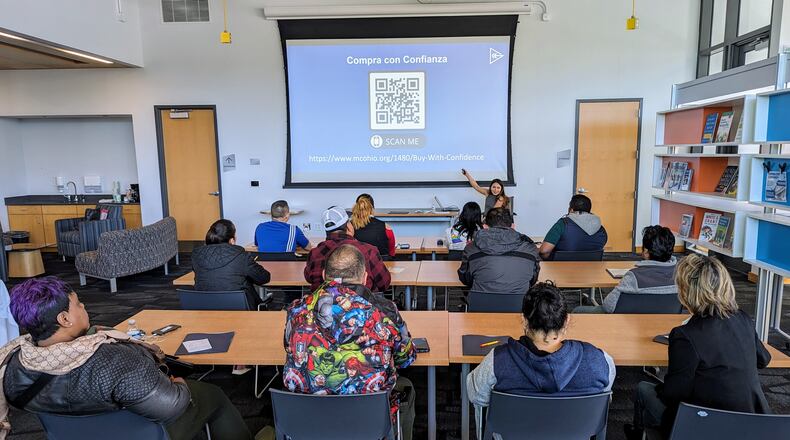In Ohio, it is legal to sell a property that has a tax delinquency or a property that has been declared a nuisance — but structural issues are required to be disclosed during the sale.
Patino-Garfias is the daughter of Hispanic immigrants and speaks Spanish. Since last year, she has met with 25 families who have come to the auditor’s office to set up payment plans for delinquent taxes that were not disclosed to them at the time of the sale.
To Patino-Garfias, one story stands out.
A woman came to the auditor’s office after buying a home through Facebook Marketplace for thousands of dollars, Patino-Garfias said.
The woman knew the Dayton home was a fixer-upper, but she envisioned her family living in it and was willing to take on the investment over a several-year span.
Not only did the woman accumulate tens of thousands in delinquent tax debt, but also her home was on the city’s demolition list — a fact she only learned when city employees came knocking on her door.
She told Patino-Garfias that she could not get the money needed to bring the home up to code in time to save it from demolition.
Weeks later, the woman returned to Patino-Garfias’ office to seek help after another property purchase in a cash transaction resulted in her discovery that the home had been sold in a sheriff’s sale.
“It broke my heart,” Patino-Garfias said.
The woman declined to speak to the newspaper about her experiences.
Montgomery County Auditor Karl Keith launched a “Buy with Confidence” campaign to provide homebuyers with information and resources to avoid being taken advantage of in the real estate market.
Keith kicked-off the campaign with a Spanish-language “Compra con Confianza” presentation at the Main Branch of the Dayton Metro Library earlier this month.
In many Latin American countries, properties that have tax delinquencies cannot be sold, Patino-Garfias said. This has proven to create confusion among local immigrant families seeking homeownership.
But county officials say that hopeful homebuyers, no matter their circumstances, can take multiple steps to protect themselves against deceptive sale practices.
If a deal appears to be “too good to be true,” it likely is, Keith said.
Keith recommends hiring a title agent to perform a title search before purchasing a property, to make sure there are no legal claims on that property.
Patino-Garfias estimated a title search can cost $250 or more.
Patino-Garfias and Keith also encourage potential buyers to visit his office’s property search website, mcrealestate.org, before making a purchase.
The site has detailed information on every property in the county, including current and delinquent tax charges.
A red flag in a property posting, Patino-Garfias said, would be if the listed seller does not match up with the county’s listed property owner.
This information, some of which might not be disclosed during certain types of real estate transactions, can help homebuyers determine if they can afford a property.
Finally, homebuyers should contact the property’s municipality to make sure that it has not been deemed a structural nuisance.
Properties with structural issues often need thousands of dollars of repairs to be safely inhabited and may be demolished by the municipality if those issues are not fixed.
Homebuyers in the city of Dayton can call 937-333-3956 to ask if a property is on their nuisance list, too.
Potential buyers who need help navigating mcrealestate.org can visit Keith’s mcauditor.org/BuyWithConfidence webpage for instructions. They can also call the Auditor’s Real Estate staff at 937-225-4326 for help in English, or Patino-Garfias at 937-225-4855 for help in Spanish.
About the Author



